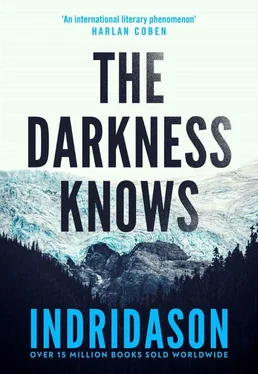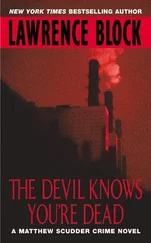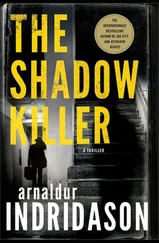In order to minimise disturbance of the evidence, a block of ice weighing almost two hundred kilos had been carved out around the body, then freed and hoisted onto the rescue team’s ice truck. A forensic technician had accompanied the chunk of glacier to Reykjavík, keeping a close eye on anything it produced as it melted. Later that evening, most of the police and rescue team members had gone down to Húsafell where they had spent the night, leaving four officers behind on the glacier to prevent any unauthorised individuals from approaching the site.
One of the country’s top glaciologists, interviewed on the radio in connection with the discovery, was quick to point out that since 1985, when Sigurvin’s body had been hidden on the glacier, the ice cap had shrunk by more than seven cubic kilometres. It was now around six hundred metres thick, but experts calculated that during the next quarter of a century the glacier would shrink by almost 20 per cent as a result of global warming.
‘And some people are still sceptical about manmade climate change!’ Konrád had heard the glaciologist saying in a tone of exasperation on the radio that morning.
‘Would the body have been laid on top of the ice or buried somehow?’ the radio host had asked.
‘Hard to say. It’s possible he was dropped into a crevasse. He went missing in February, when freezing temperatures would have made it extremely difficult to dig into the ice. But he would have been covered with snow quickly enough. Another possibility is that a crevasse subsequently opened and swallowed him up, and he remained there until his recent reappearance.’
‘Did the ice just melt to reveal him, then?’
‘Of course, that will require further analysis, but it sounds plausible. It would be the simplest explanation for why he’s turned up now.’
Yet again Konrád’s mobile phone shattered the silence of his house in Árbær. This time it was Svanhildur, wanting to know what he was planning to do. She’d heard that Hjaltalín was asking to see him.
‘I don’t know,’ Konrád said. ‘Maybe it wouldn’t hurt to talk to him — to hear what he’s got to say.’
‘Oh, come on! You must be dying of curiosity. This is Sigurvin we’re talking about! Surely that must spark your interest?’
‘Hjaltalín wasn’t even thirty when we arrested him,’ Konrád remarked.
‘I remember it well.’
‘He must be pushing sixty now. I haven’t seen him for donkey’s years.’
‘Do you think he’ll have changed much?’
‘I think he’ll be the same idiot.’
‘You two weren’t exactly best mates.’
‘No,’ said Konrád. ‘Though he seemed to think we were. I don’t know what he wants to talk to me about. The fact is, I wouldn’t trust Hjaltalín as far as I could throw him. He wouldn’t be in custody now if they hadn’t thought he was trying to make a run for it. He was on the point of leaving the country when they arrested him. That was the day after Sigurvin was identified. He claimed it was a complete coincidence.’
‘Are you sleeping any better these days?’
‘Not much.’
‘You know you can always call me if there’s something bothering you,’ Svanhildur said. ‘If you want to chat.’
‘Yes, but I’m fine,’ Konrád said brusquely.
‘All right.’ Svanhildur was about to ring off, then added, as if she couldn’t help herself: ‘You never get in touch any more.’
‘No, I...’ Konrád didn’t know what to say.
‘Just call if...’
He didn’t respond and they ended the call. He took a sip of wine and lit another cigarillo. He and Erna had sometimes talked about downsizing and moving away from Árbær. Not to some block of flats for pensioners but to a cosy little place near the city centre. Though not in Thingholt or any of those old streets east of the lake, Erna had said, as there were too many party animals living there nowadays. To the west end, rather. Nothing had come of it, though. He remembered how often they had discussed the Sigurvin case at this kitchen table, and how she had always been there for him, whatever happened.
The table in the sitting room was covered with old papers of his father’s that Konrád had been looking through the evening Svanhildur had rung with the news about Sigurvin. They’d been in a cardboard box in the basement and he hadn’t given them so much as a glance in decades. It had been getting mixed up in an old case from the Second World War, involving fraudulent spiritualists, that had resurrected his long-buried interest in his father’s fate. He had been discovered one evening in 1963, lying fatally stabbed in front of the South Iceland Abattoir on Skúlagata. Despite an extensive investigation, the murder had never been solved. Konrád had banished the incident from his mind during all the long years he had worked as a detective. His father had been a troublesome, vindictive man, who had made enemies on every side. He had done stints behind bars for smuggling, theft and fraud. And that wasn’t the half of it. He had also conspired with at least one, if not more, fake mediums during the war. Konrád’s mother had eventually fled their home, taking Beta with her, but her husband had refused to let her take their son, who had remained behind, growing up with his father in the Shadow District.
Konrád leafed through the yellowing papers. His interest had been piqued by a handful of newspaper cuttings on spiritualism and the paranormal that his father had kept. Among them was an article about conmen, and an interview with an Icelandic psychic in a long-defunct weekly newspaper. Another cutting was from a publication by the Society for Psychical Research, discussing the afterlife and ‘the Ether World’. The articles dated from about two years before Konrád’s father had been stabbed outside the abattoir. They had led Konrád to wonder if, in the final months of his life, his father could have returned to his old bad habits of swindling money out of people through fake seances.
Konrád had not been happy when the custody facilities were moved to the Litla-Hraun prison ten years back. He was soon fed up with having to drive sixty kilometres over the Hellisheidi mountain road and down through the Threngsli pass, crossing the River Ölfusá where it flowed into the sea, then heading east along the coast towards the villages of Eyrarbakki and Stokkseyri. Some of his colleagues, on the other hand, found it a pleasant break from the city and the constant stress at the police station. Konrád had got his car stuck in a snowdrift on Hellisheidi twice in the same winter, but there were other times when he had been able to enjoy the journey, using it as a chance to relax and take a detour through the Sudurland towns of Hveragerdi and Selfoss, even stopping to buy himself an ice cream on the way.
For many years before that, the custody facilities had been at the prison on Sídumúli in Reykjavík, conveniently close to the police station. That was where Hjaltalín had been detained during the original inquiry. But times had changed, Konrád thought, as he took the main road out of town across the seemingly endless expanse of moss-covered lava fields, passing the familiar landmarks: the green-roofed building of the Little Cafe, standing alone among the wastes, and the distinctive black-cinder slopes of Mount Vífilfell.
He had finally come round to the idea of visiting Hjaltalín in custody. Not because Hjaltalín had insisted and refused to speak to anyone else, but because Konrád had invested so much time and energy in the original investigation. He’d never really stopped looking for answers. All the hard graft that he and other members of CID had put into the inquiry had ultimately been wasted. The case had been a rarity in that it hadn’t been wrapped up in a matter of days, like most major crimes in Iceland. The investigation had quickly ended up all over the place, badly lacking direction; they’d never found a body, and although Hjaltalín had been the main focus, countless other people had been interviewed as potential suspects. Now, the discovery of Sigurvin’s body had cracked the case wide open again.
Читать дальше












